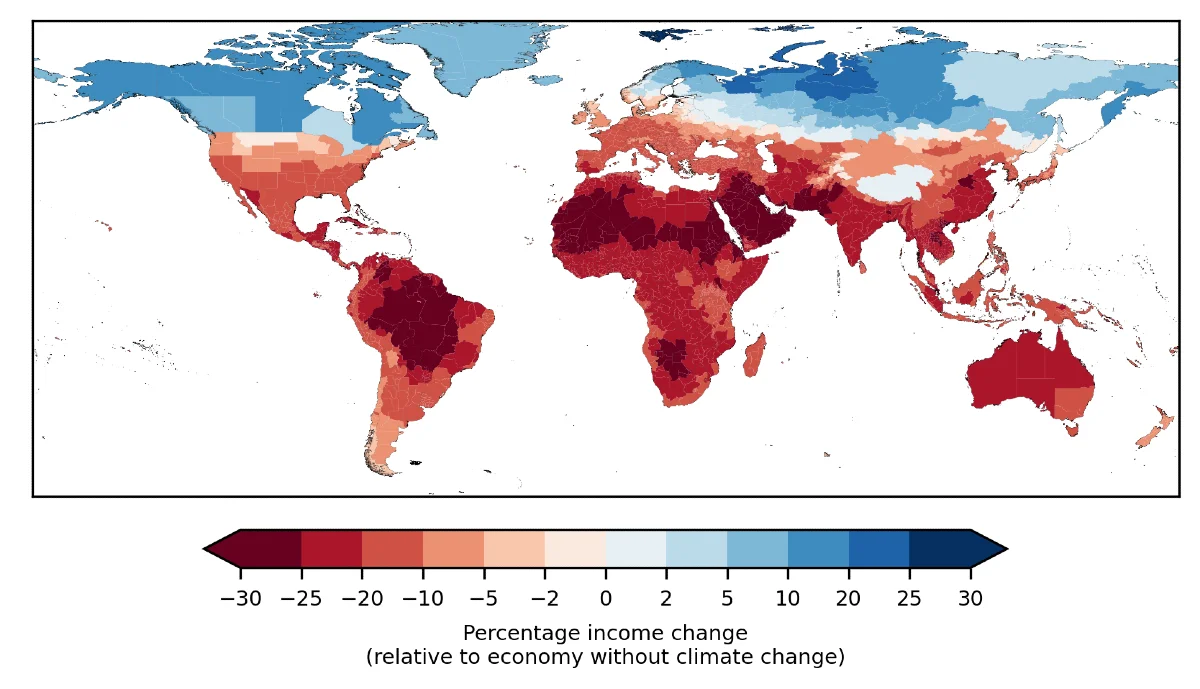A new report by the Potsdam Institute for Climate Impact Research published in Nature reveals a stark future: by the middle of this century, climate change could reduce global average incomes by 19%, equating to an annual economic loss of $38 trillion. This profound economic impact highlights a critical, yet costly, battle against time and temperature.
Inevitable Economic Downturn: The Climate Cost
As extreme weather becomes more common across the globe, the economic ramifications are vast and varied. According to the study, these effects are already “locked in”—meaning they will occur regardless of any future efforts to curb emissions. This inevitability underscores the urgency of global initiatives to mitigate climate impacts.
Maximilian Kotz, co-author of the report, emphasized these economic disruptions. Over the next 25 to 30 years, we expect consistent economic impacts across all emissions scenarios,” Kotz stated, pointing out that neither aggressive nor moderate emission reductions will avert the forecasted economic downturn.

Sector-Specific Strains: Work and Agriculture Suffer
The report also sheds light on the specific sectors that will bear the brunt of climate change. Industries requiring outdoor labor, such as construction and manufacturing, are particularly vulnerable to productivity losses due to increased temperatures. Agriculture, too, faces significant threats from heat, further complicating food security and economic stability in many regions.
The study leveraged climate and economic data spanning four decades and more than 1,600 regions worldwide to project these future impacts. It notably highlights that those who have contributed least to global emissions—predominantly in lower latitudes with lower incomes—are poised to suffer the most severe economic losses.
Economic Analysis: Cost of Inaction vs. Mitigation
Interestingly, the researchers propose that the cost of addressing climate change could be far less than the expense of enduring its impacts. They estimate that the expense of reducing greenhouse gas emissions could be just one-sixth of the projected $38 trillion damage by 2050. This financial comparison aims to bolster international commitment to climate action.
Underestimations and Overlooked Impacts
Yet, the study may still underestimate the full economic toll of climate change. It doesn’t account for several critical factors, including the effects of heatwaves, sea-level rise, tropical cyclones, ecological disruptions, and health impacts—all of which could amplify the already daunting economic forecasts.
As the world grapples with these predictions, the Potsdam Institute’s report serves as a clarion call to intensify global efforts against climate change.
The economic data presented not only underscores the broad and severe impacts expected, but also the potential for mitigative actions to significantly lessen the financial burden of our warming world.
More To Discover
- Siemens Energy’s Wind Turbine Woes Reflect Challenges in Germany’s Energy Shift
- Science Class or Beef Commercial? How the Beef Industry is Targeting Your Kids’ Classrooms
- 8 Unexpected Ways to Decarbonize the Shipping Industry Immediately
- Pet Tech Privacy Issues: The Hidden Risks in Your Smart Pet Gadgets
This report highlights a pivotal choice for global policymakers: invest in prevention now, or pay a much steeper price in the future.
Source: Nature




















